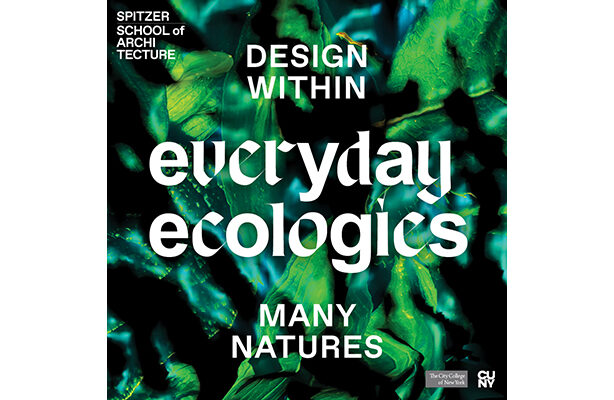Events
Everyday Ecologies: Lecture 1
Panelists: Andrea Johnson, Amy Lerner, Sierra Bainbridge, Lindsay Campbell, moderator: Thaisa Way
Thursday, Oct 22, 2020
6:00 pm - 8:00 pm
Online - Zoom
Free and open to the public - Please register for this Zoom event here.
The future of the human species is bound up in how we design, plan, and live within emergent extremes in global ecosystems. Paralysis in the face of contentious issues, uncritical acceptance of traditional roles, sectors, and hierarchies, and unquestioned long-held truths inhibit development of new ideas and approaches to design effectively. To instigate new approaches, we have invited designers, planners, historians, and social scientists to talk about Everyday Ecosystems: the boundless communities we are part of—a cocktail of cultures crossing economic and class strata with overlapping gender, racial, and spiritual identities—that complement but also compete with each other and conflict internally for rights and means to perpetuate their cultural identities, social relations, and environmental resource needs and desires.
Speakers will present a “zombie” idea or theory that one of their projects contests through design, planning, or projective research and analysis. Together, we aim to develop principles that will establish a foothold from which to launch a new approach to design and planning discourse based neither on privileged solutions by experts nor abdication of authorship in lieu of community determinism.
Meet the contributors:
Sierra Bainbridge, RLA is Senior Principal and Managing Director at MASS Design Group, a non-profit practice that asserts architecture as a right and “public good” and that designers are as accountable for social injustices as they are critical levers to improve the communities they serve. Currently Sierra directs the ongoing design and implementation of MASS’s planning and architectural projects, including The Kayanja Center, an academic facility supporting rural health care delivery and research in Uganda. Sierra served as Head of the Architecture Department at the Kigali Institute of Science and Technology (KIST) in Rwanda. Select features of Sierra’s work with MASS Design Group include A+U Magazine, Lotus, Mark Magazine, and Detail.
Lindsay Campbell is Research Social Scientist with the United States Department of Agriculture Forest Service’s Northern Research Station, located at the NYC Urban Field Station. Her book, City of Forests, City of Farms examines how the politics and practices of urban forestry and urban agriculture in New York City are negotiated. Her research explores the dynamics of urban politics, natural resource stewardship, and sustainability policymaking. She is joint PI of STEW-MAP, which maps the social networks and spatial turf of environmental stewardship groups. Lindsay also helps lead the Science of the Living City program for the NYC Urban Field Station, including the artists in residence program.
Andrea Johnson is a lecturer in the graduate landscape architecture program at CCNY. Her work explores the intersection of urban infrastructural systems, social and cultural values, and ecological flux. As the research director of Terreform, she coordinated a number of projects, most notably the organization’s forthcoming book Home Grown, which proposes an integrated planning and design framework for more resilient, just, and equitable urban food networks. Andrea is a 2020-2021 Landscape Architecture Foundation Fellow, where she is investigating decentralized energy transitions in NYC and the ways in which design can reinforce community movements that are interacting with physical infrastructure in new and creative ways.
Amy Lerner is an Associate Professor in Urban Studies and Planning at UC San Diego. From 2015 to 2020 she was an assistant professor in the National Laboratory for Sustainable Science in the Ecology Institute of the National Autonomous University of Mexico, UNAM, Mexico City where she taught courses on Sustainability Science, Transdisciplinary Research Methods, and Global Environmental Change and le research projects in Mexico City related to city-university partnerships, the persistence of peri-urban agriculture, and capacity-building in the local city government for risk management and resilience. Her research focuses on processes of landscape change and especially on the rural-urban frontier, sustainable aspects of city planning, including resilience, green infrastructure, and urban and peri-urban agriculture, and the science-policy interface.
Thaisa Way is an urban landscape historian at the University of Washington and Program Director of Garden & Landscapes Studies at Dumbarton Oaks Research Library and Collections where she leads a Mellon Urban Humanities Initiative titled "Democracy and the Urban Landscape: Race, Identity, and Difference." Her publications include: Unbounded Practices: Women, Landscape Architecture, and Early Twentieth Century Design (2009, awarded the J.B. Jackson Book Award in 2012), From Modern Space to Urban Ecological Design: the Landscape Architecture of Richard Haag (2015) and GGN 1999-2018 (2018). She has edited two books in urban environmental history and practice: Now Urbanism with Jeff Hou, Ken Yocom, and Ben Spencer (2013), and River Cities/City Rivers (2018).
Denise Hoffman Brandt, RLA is former Director and Professor in the Graduate Landscape Architecture Program at the City College of New York and Principal of Hoffman Brandt Projects, LLC. Selected speculative design research projects have focused on: refugee camps (in The Right to Landscape 2011), carbon storage infrastructure (City Sink 2013), and climate-adaptive infrastructure (Waterproofing New York, co-edited with Catherine Seavitt Nordenson 2014). Critical writing includes “The body in the library, or a blood meridian” (Journal of Landscape Architecture March 2018.
Export as:


